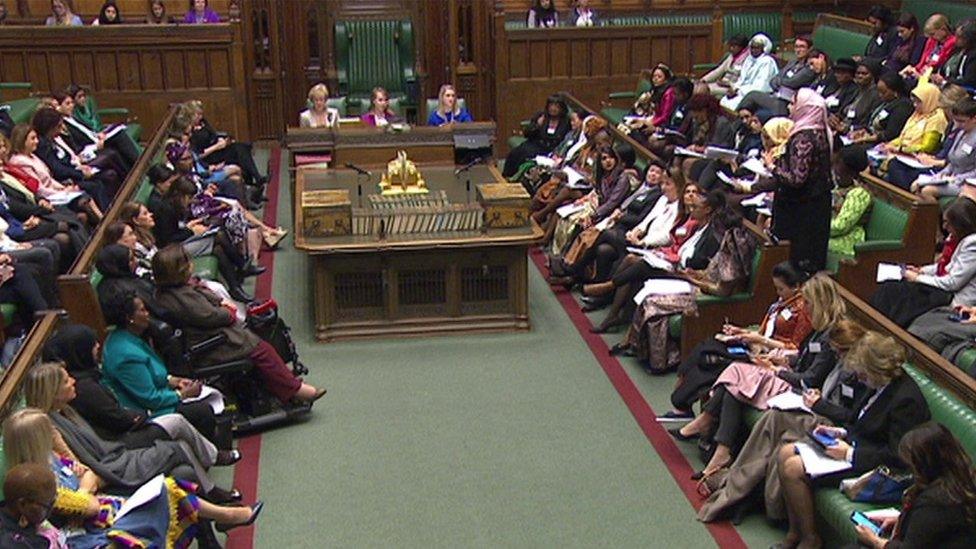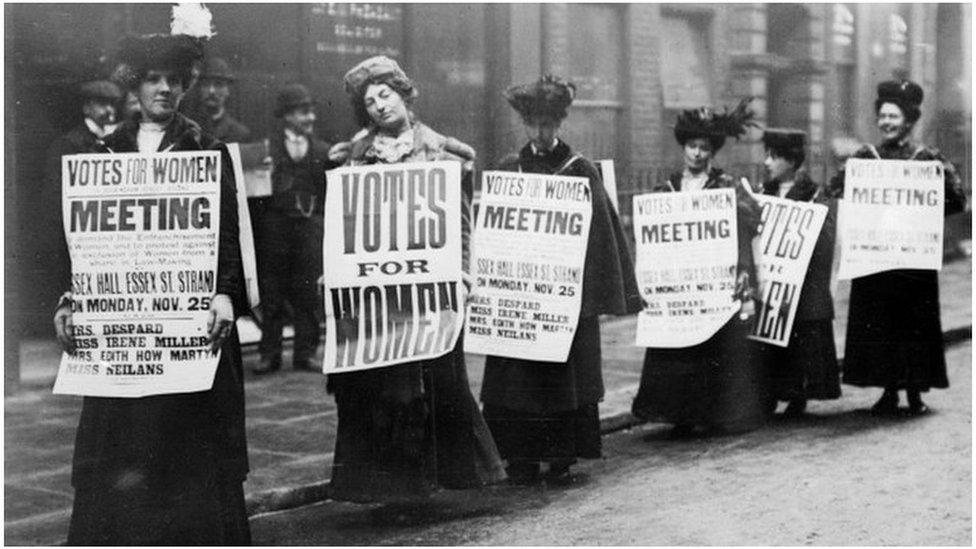Female MPs from 86 countries mark 100 years of women's suffrage
- Published

120 female MPs from 86 countries gather in the House of commons to discuss how to further empower women in politics
Female politicians from 86 countries gathered in the Commons to mark 100 years since women in the UK won the right to vote.
UK Women's Minister Penny Mordaunt welcomed 120 women to Parliament, to celebrate achievements and discuss how to further empower women in politics.
She hailed the "heroines of our nation" who secured the right for women to stand for election and to vote.
The event aims to inspire the next generation of female political leaders.
It marks the 100th anniversary of the first women in the UK receiving the right to stand for election to Parliament, which came in the same year as some women being allowed to vote.
At the start of the day's events, Ms Mordaunt said the women who fought for the right to vote were "heroines of our nation".
"One hundred years ago, women in the UK were unable to run for office, or vote, or even be present in the public gallery," she said.
Pointing upwards, she said: "And if you look up at the top of the chamber, you will see the ventilation shaft where women would peer through, having gathered in the attic space, where they viewed the proceedings below that affected their lives.
"Often they would hear men voicing widely-held concerns that if women were given the vote it would be the end of everything, the downfall of the family, society, the nation.
"But those women knew even then that the opposite was true, that without their rights being secured, and their lives being fulfilled, family, society and nation could never really thrive."

Around 8.4 million women across the UK gained the vote on 21 November 1918
She added that today's female politicians faced private challenges - from juggling multiple caring responsibilities to battling to be taken seriously, sexual harassment, intimidation and abuse.
Veteran MP Harriet Harman - former Labour deputy leader - spoke of the achievements of the women in attendance.
"We are all pioneers, we have all made a lot of progress but actually we are still women trying to make progress, in what is largely a man's world."
Labour shadow home secretary Diane Abbott spoke of her own personal experience: "I was the first black woman ever elected to the British Parliament. I wouldn't want you to think I was elected because my party leader thought we should have a black woman in Parliament. Actually there was struggle and anything worth achieving will always require struggle."
The Women MPs of the World Conference aims to encourage women's participation in parliaments globally, and demonstrate how elected women around the world are shaping the political agenda.
Ya Kumba Jaieth, an MP from the National Assembly of Gambia, called for female MPs across the world to create a support network for each other.
"We have been electing these men for so long, I think they have failed us. Only we understand our power and only we can empower ourselves"
Allow X content?
This article contains content provided by X. We ask for your permission before anything is loaded, as they may be using cookies and other technologies. You may want to read X’s cookie policy, external and privacy policy, external before accepting. To view this content choose ‘accept and continue’.
Allow X content?
This article contains content provided by X. We ask for your permission before anything is loaded, as they may be using cookies and other technologies. You may want to read X’s cookie policy, external and privacy policy, external before accepting. To view this content choose ‘accept and continue’.
The discussion followed a Downing Street reception last night, at which Prime Minister Theresa May said more women getting involved in politics would mean a "greater focus on preventing gender-based violence, on girls' education, on childcare and on women's health" and ultimately "a better government".
"A parliament where women are a rare sight is a parliament working with one hand tied behind its back," the prime minister said.
She added "if half the population is systematically excluded from politics, then you're also excluding half the talent".
Leader of the House Andrea Leadsom chaired the session and paid tribute to Dame Tessa Jowell during her speech to highlight her work in British politics.
The event follows a report by the Fawcett Society , external last week, which suggested that white middle-class men were still seen as the "ideal" political candidate, and many women MPs reported being discouraged from putting themselves forward for selection because they had children.